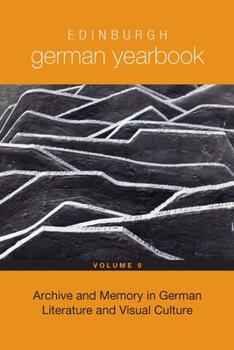Edinburgh German Yearbook 9: Archive and Memory in German Literature and Visual Culture
(Book #9 in the Edinburgh German Yearbook Series)
Explores the changing relationship between memory and the archive in German-language literature and culture since 1945.
In recent years, the discourse of memory - and of German memory culture in particular - has become increasingly concerned with questions of the archive. An archive can refer to a physical place, the material found there, or the system that orders this material; in its broadest sense, it might refer to something public (records housed in a municipal building), or something private (photographs in a family album). The material and documentary qualities of the archive confer on it an authenticating function attributed only cautiously to memory, but theories of the archive have questioned the status of material, documentary vestiges of the past. Memory and the archive are inextricablylinked, but how does this affect the mediation of the past? This volume explores the changing relationship between memory and the archive in German-language literature and culture since 1945. Contributions approach this topic froma range of perspectives (film, visual culture, urban culture, digital technology, as well as literature) and offer illuminating studies of Harun Farocki, Anselm Kiefer, Thomas Demand, Bernd and Hilla Becher, J rgen Fuchs, StefanWolter, and Sasa Stanisic. Contributors: Priyanka Basu, Carol Anne Costabile-Heming, Regine Criser, Tobias Ebbrecht-Hartmann, Diana Hitzke and Charlton Payne, Caitr ona Leahy, Dora Osborne, Annie Ring, Lizzie Stewart, Simon Ward. Dora Osborne is Lecturer in German at Durham University.
In recent years, the discourse of memory - and of German memory culture in particular - has become increasingly concerned with questions of the archive. An archive can refer to a physical place, the material found there, or the system that orders this material; in its broadest sense, it might refer to something public (records housed in a municipal building), or something private (photographs in a family album). The material and documentary qualities of the archive confer on it an authenticating function attributed only cautiously to memory, but theories of the archive have questioned the status of material, documentary vestiges of the past. Memory and the archive are inextricablylinked, but how does this affect the mediation of the past? This volume explores the changing relationship between memory and the archive in German-language literature and culture since 1945. Contributions approach this topic froma range of perspectives (film, visual culture, urban culture, digital technology, as well as literature) and offer illuminating studies of Harun Farocki, Anselm Kiefer, Thomas Demand, Bernd and Hilla Becher, J rgen Fuchs, StefanWolter, and Sasa Stanisic. Contributors: Priyanka Basu, Carol Anne Costabile-Heming, Regine Criser, Tobias Ebbrecht-Hartmann, Diana Hitzke and Charlton Payne, Caitr ona Leahy, Dora Osborne, Annie Ring, Lizzie Stewart, Simon Ward. Dora Osborne is Lecturer in German at Durham University.
Format:Hardcover
Language:English
ISBN:1571139230
ISBN13:9781571139238
Release Date:November 2015
Publisher:Camden House (NY)
Length:218 Pages
Weight:1.09 lbs.
Dimensions:0.6" x 6.0" x 9.0"
Customer Reviews
0 rating





